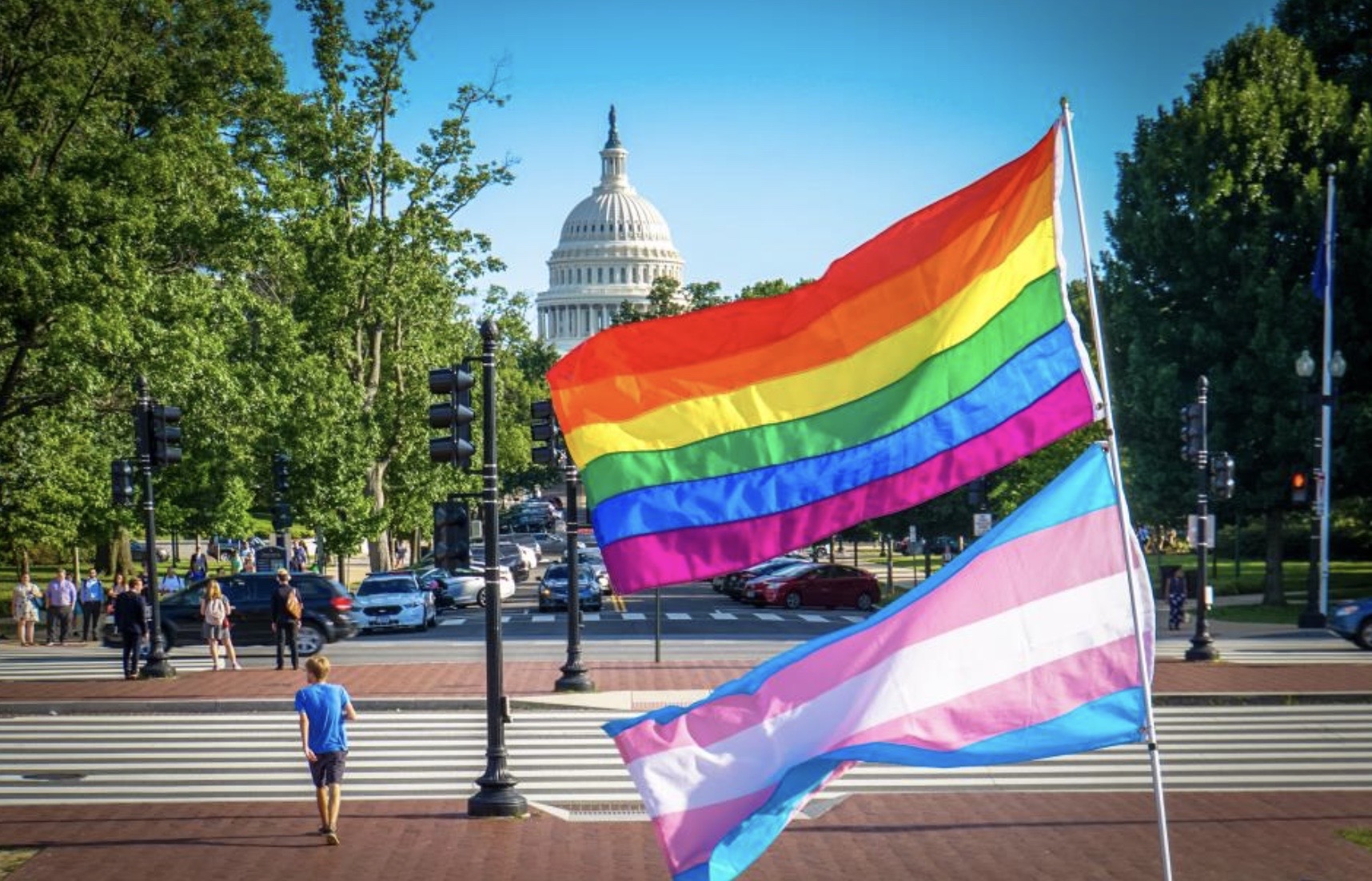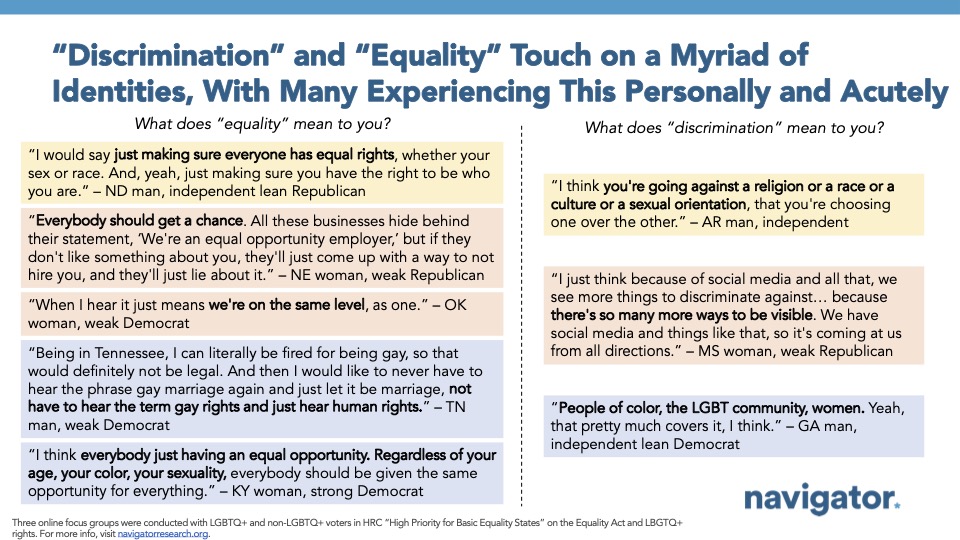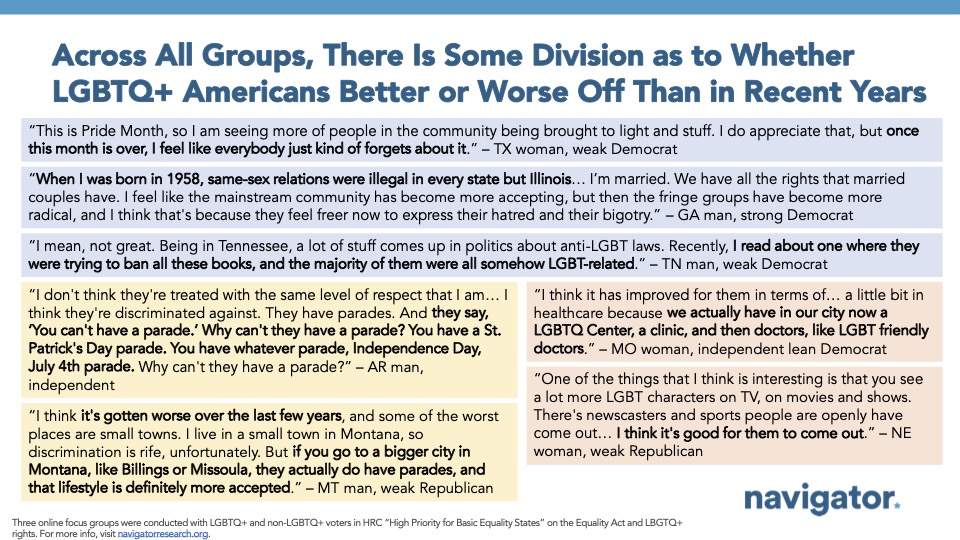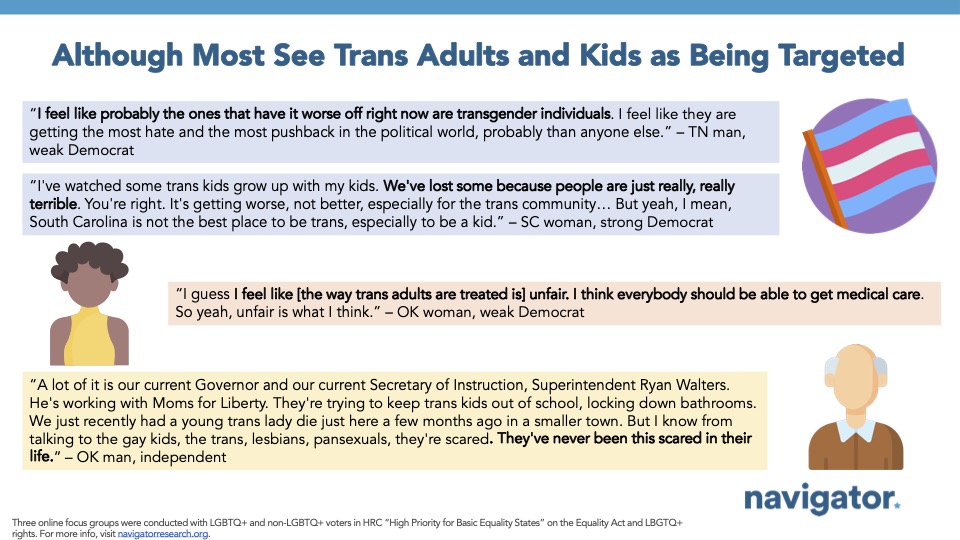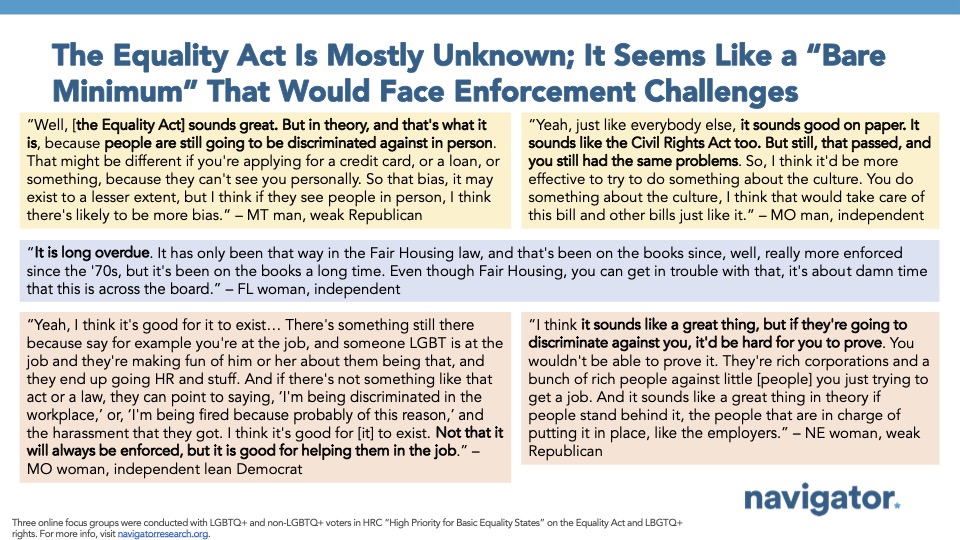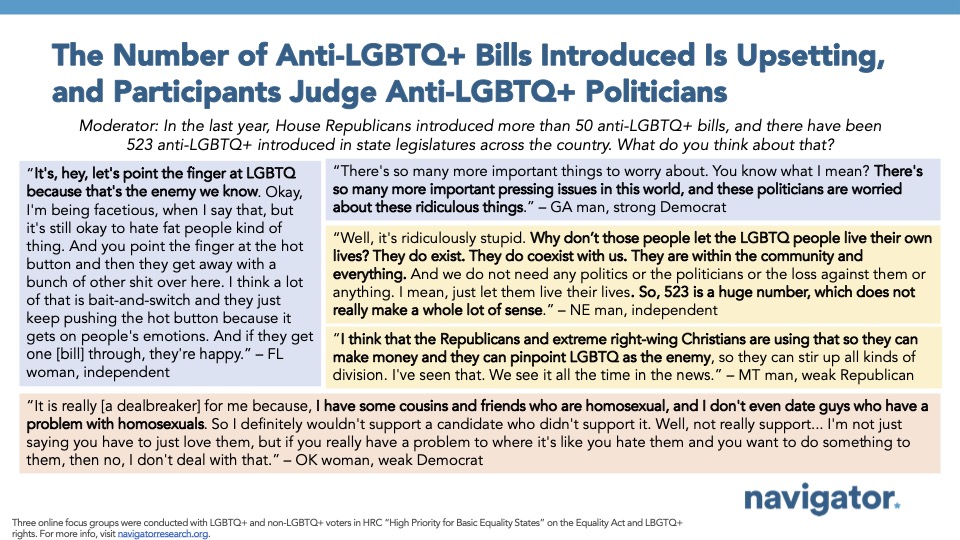Focus Groups: LGBTQ+ Community
This Navigator Research report contains findings from focus groups among Americans identifying as part of the LGBTQ+ community, as well as soft partisans and independents, in states with anti-LGBTQ+ laws on how they view discrimination and equality, including the state of LGBTQ+ rights in the country, and how participants feel about legislation and government officials targeting members of the LGBTQ+ community.
Participants see “discrimination” and “equality” affecting a wide range of identities, with many citing personal experiences or observations.
Participants noted that discrimination spans a wide range of demographics. As one independent man from Arkansas noted: “I think you’re going against a religion or a race or a culture or a sexual orientation, that you’re choosing one over the other.” Some felt discrimination is getting more prevalent because of the internet, including one Republican woman from Mississippi who said: “I just think because of social media and all that, we see more things to discriminate against… because there’s so many more ways to be visible. We have social media and things like that, so it’s coming at us from all directions.” When asked about “equality,” participants largely expressed themes of equal treatment and equal opportunities, with one Democratic woman from Kentucky expressing: “I think everybody just having an equal opportunity. Regardless of your age, your color, your sexuality, everybody should be given the same opportunity for everything.”
- When asked “what does the word equality mean to you?,” one Republican woman from Nebraska said: “Everybody should get a chance. All these businesses hide behind their statement, ‘We’re an equal opportunity employer,’ but if they don’t like something about you, they’ll just come up with a way to not hire you, and they’ll just lie about it.” One independent man from North Dakota said of “equality”: “I would say just making sure everyone has equal rights, whether you’re, sex or race. And, yeah, just making sure you have the right to be who you are.”
Despite recent progress in LGBTQ+ rights, most see transgender Americans as a targeted group.
Across groups, there is division as to whether LGBTQ+ Americans have it better or worse in recent years — though most see transgender adults and kids as being targeted. Several participants recalled their experience with discrimination of the LGBTQ+ community through the years, noting modest improvements but still seeing hatred towards the community, including one Democratic man from Georgia who said: “When I was born in 1958, same-sex relations were illegal in every state but Illinois… I’m married. We have all the rights that married couples have. I feel like the mainstream community has become more accepting, but then the fringe groups have become more radical, and I think that’s because they feel freer now to express their hatred and their bigotry.” Participants also noted that transgender Americans have been the most recent targets of discrimination against the LGBTQ+ community. As one Democratic man from Tennessee expressed: “I feel like probably the ones that have it worse off right now are transgender individuals. I feel like they are getting the most hate and the most pushback in the political world, probably than anyone else.”
- Participants shared concern over the targeting of trans youth in particular, including one Democratic woman from South Carolina who said: “I’ve watched some trans kids grow up with my kids. I don’t know, we’ve lost some because people are just really, really terrible. You’re right. It’s getting worse, not better, especially for the trans community… But yeah, I mean, South Carolina is not the best place to be trans, especially to be a kid.”
- One independent man from Oklahoma noted government institutions targeting trans youth: “A lot of it is our current Governor and our current Secretary of Instruction… they’re trying to keep trans kids out of school, locking down bathrooms. We just recently had a young trans lady die just here a few months ago in a smaller town. But I know from talking to the gay kids, the trans, lesbians, pansexuals, they’re scared. They’ve never been this scared in their life.”
- The topic of transgender youth being targeted in healthcare spaces came up naturally, including one Democrat from Oklahoma who said: “I guess I feel like [the way transgender adults are treated is] unfair. I think everybody should be able to get medical care. So yeah, unfair is what I think.”
The Equality Act seems like an obvious needed action, even if many are skeptical of adequate enforcement.
The Equality Act is mostly unknown, with most across groups expressing it would be a bare minimum action to be taken to protect LGBTQ+ individuals. Across groups, the Equality Act had minimal name recognition, but when given more information, participants largely agreed with its intended purpose but were skeptical of enforcement, including one Republican woman from Nebraska who said: “I think it sounds like a great thing, but if they’re going to discriminate against you, it’d be hard for you to prove… they’re rich corporations and a bunch of rich people against little [people] you just trying to get a job. And it sounds like a great thing in theory if people stand behind it, the people that are in charge of putting it in place, like the employers.” Some felt the bill would be easier to apply to certain aspects of life where discrimination occurs as one Republican man from Montana noted: “…people are still going to be discriminated against in person. That might be different if you’re applying for a credit card, or a loan, or something, because they can’t see you personally. So that bias, it may exist to a lesser extent…”
- An independent woman from Missouri said: “I think it’s good for it to exist… there’s something still there because say for example you’re at the job, and someone LGBT is at the job and they’re making fun of him or her about them being that, and they end up going [to] HR and stuff. And if there’s not something like that act or a law, they can point to saying, ‘I’m being discriminated in the workplace…’” An independent woman from Florida stated: “It is long overdue. It has only been that way in the Fair Housing law, and that’s been on the books since, well, really more enforced since the ’70s, but it’s been on the books a long time. Even though fair housing, you can get in trouble with that, it’s about damn time that this is across the board.”
Participants were concerned by the number of anti-LGBTQ+ bills introduced, and expressed judgment for politicians with anti-LGBTQ+ agendas.
When given the information that 523 anti-LGBTQ bills have been introduced nationwide, participants largely were upset with government officials putting energy into such legislation, with one independent from Nebraska stating: “Well, it’s ridiculously stupid. Why don’t those people let the LGBTQ people live their own lives? They do exist. They do coexist with us. They are within the community and everything. And we do not need any politics or the politicians or the loss against them or anything. I mean, just let them live their lives. So 523 is a huge number, which does not really make a whole lot of sense.” When asked if they could support a politician who supports these bills, most expressed they could not, including one Democratic woman from Oklahoma expressing: “It is really [a dealbreaker] for me because, I have some cousins and friends who are homosexual, and I don’t even date guys who have a problem with homosexuals. So I definitely wouldn’t support a candidate who didn’t support it.”
- Many participants expressed frustration that government officials would use their resources to promote anti-LGBTQ initiatives, rather than on other more pressing issues, including one Democratic man from Georgia who said: “There’s so many more important things to worry about. You know what I mean? There’s so many more important pressing issues in this world, and these politicians are worried about these ridiculous things.”
- When talking about why politicians would support anti-LGBTQ legislation, one Republican man from Montana expressed: “I think that the Republicans and extreme right-wing Christians are using that so they can make money and they can pinpoint LGBTQ as the enemy, so they can stir up all kinds of division. I’ve seen that. We see it all the time in the news.”
About The Study
GBAO conducted three online focus groups June 24, 2024 with LGBTQ+ and non-LGBTQ+ Democrats, Republicans, and independents. Some quotes have been lightly edited for brevity. Qualitative results are not statistically projectable.
